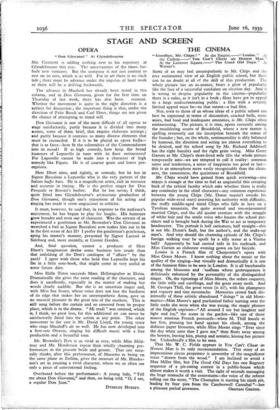STAGE AND SCREEN
OPERA
"Don Giovanni " At Glyndebourne
MR. CHRISTIE is adding nothing new to his repertory at Glyndebourne this yea:. Thz: uncertainties of the times for- bade new ventures. But the company is not just content to rest on its oars, which is as well. For in art there is no slack tide ; there must be advance under the impetus of hard work or there will be a drifting backwards.
The advance in Macbeth has already been noted in this column, and in Don Giovanni, given for the first time on
Thursday of last week, there has also been 3vemcnt. Whether the movement is quite in the right direction is a subject for discussion ; the important thing is that, under the direction of Fritz Busch and Carl Ebert, things are not given the chance of attempting to stand still.
Don Giovanni is one of the most difficult of all operas to stage satisfactorily, partly because it is divided into many scenes, some of them brief, that require elaborate settings ; and partly because it contains so many diverse elements that must be reconciled. If it is to be played as opera buffa- that is as farce—how fit the solemnities of the Commendatore into its mood? If as high comedy, how keep the broad humours of Leporello in time with its finer seriousness? For Leporello cannot be made into a character of high comedy like Figaro. He is of coarser grain and lower per- ceptions.
Herr Ebert aims, and rightly, at comedy, but he has in Signor Baccaloni a Leporello who is the very pattern of the Italian buffo bass. He is a magnificent artist, rich in resource and accurate in timing. He is the perfect singer for Don Pasquale or Rossini's barber. But he has never, I think, quite fitted into Glyndebourne's aristocratic production of Don Giovanni, though one's enjoyment of his acting and singing has made it seem ungracious to criticise.
It must, however, be said that, in response to the audience's enjoyment, he has begun to play for laughs. His humours grow broader and even out of character. Was the servant of so experienced a gentleman as Mr. Brownlee's Don Giovanni so wretched a fool as Signor Baccaloni now makes him out to be in the first scene of Act II? I prefer the gentleman's gentleman, aping his master's manner, presented by Signor Lazzari at Salzburg and, more recently, at Covent Garden.
And, final question, cannot a producer of Herr Ebert's imagination devise some business less crude than that unfolding of the Don's catalogue of " affairs " by the yard? I agree with those who hold that Leporello kept his list in a little note-book, that might come in very useful at some future date.
Miss Hella Toros succeeds Mme. Helletsgruber as Elvira. Dramatically she gives the same reading of the character, and does it excellently, especially in the matter of making her words clearly audible. But she is an uncertain singer and, with Miss Ina Souez, whose voice does not lose the hardness of its edge that makes her an unsympathetic Anna, gave us no musical pleasure in the great trio of the maskers. This is still sung before the curtain and so removed from its proper place, which is in the drama. " Mi tradi " was omitted, which is, I think, no great loss, for this additional air can never be satisfactorily fitted into the action at any point. The other newcomer to the cast is Mr. David Lloyd, the young tenor who sings Macduff's air so well. He has now developed into a first-rate Ottavio, singing his difficult music with a free production and a beautiful tone.
Mr. Brownlee's Don is as vivid as ever, while Miss Mild- may and Mr. Henderson repeat their wholly charming per- formances as the peasant bride and groom. That one natu- rally thinks, after this performance, of Massetto as being on the same plane as Zerlina, gives the measure of Mr. Hender- son's art in creating a vivid character, where we so often see only a piece of conventional fooling.
Overheard before the performance: A young lady, "Tell me about Don Giovanni," and then, on being told, " 0, I see, a regular Don Juan."
DYNELEY HUSSEY.






















































 Previous page
Previous page